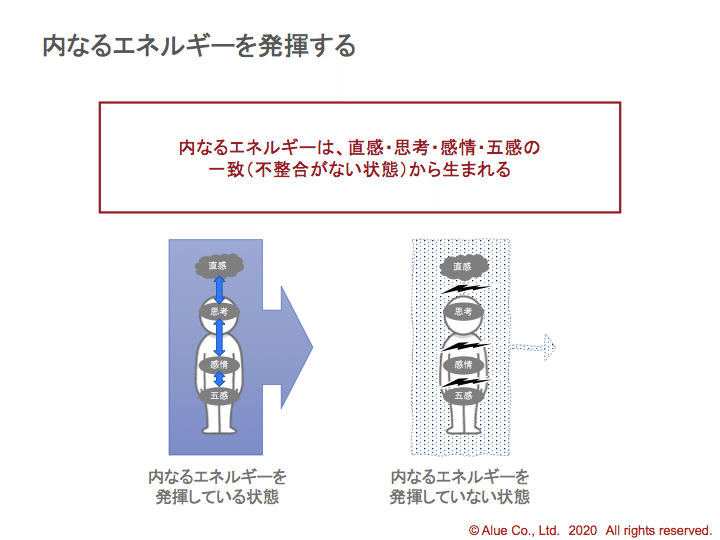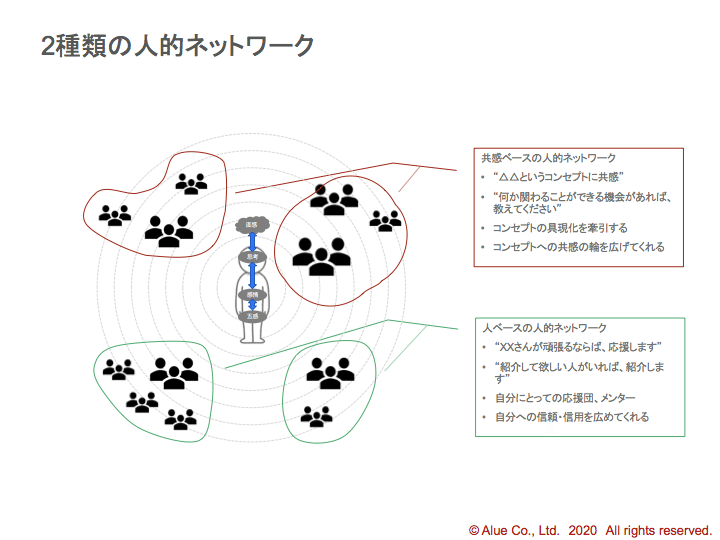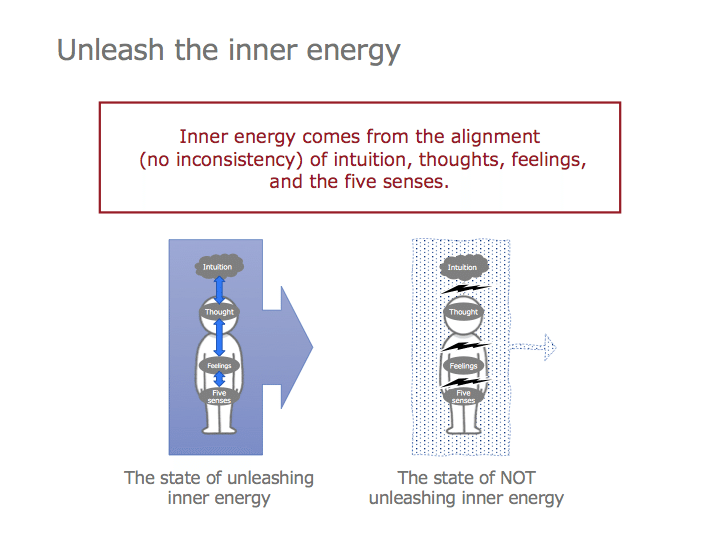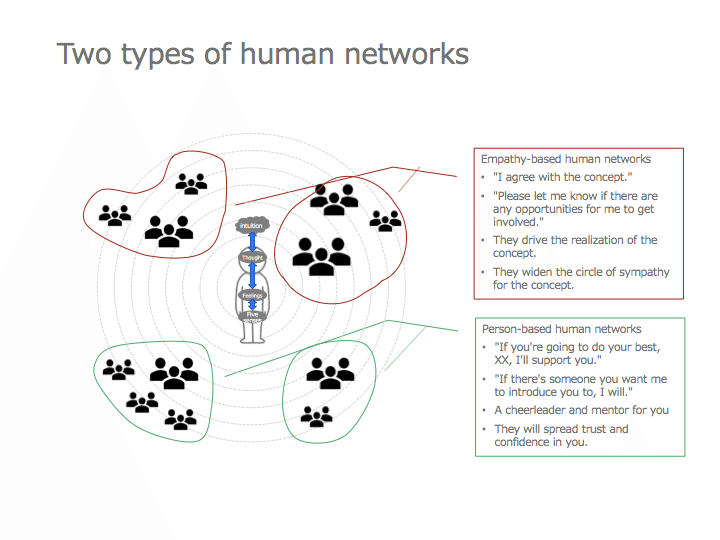
主体的真理に生きると、どんないいことがあるのか?①
前回の記事では、主体的真理を3+1意識モデルの中で位置付けることにより、「主体的真理は目的レベル(Whyレベル)のものが統覚されたもの」ということをお話しました。抽象的な表現ではありますが、このような形で全体像の中で位置付けることによって、主体的真理についての理解を深めることができます。
今回の記事では、主体的真理に生きる状態とは具体的にどのようなものか、どのようなことが起こりえるのかについてお話したいと思います。主体的真理に生きるといっても、「主体的真理に生きる状態」と「そうではない状態」が2つあって、白黒が明確に分かれているというものではありません。
「主体的真理に生きる」という方向に近づくという感覚があるだけです。近づけば近づくほど、面白いこと、楽しいこと、充実感を感じられることが増えていくというイメージです。車でドライブしている比喩でいえば、今どこを走っているということは関係ありません。今この瞬間に心地よく走れているという感覚があるかがポイントになります。
主体的真理に生きるとエネルギーが内側から湧く
主体的真理に生きると、エネルギーが内側から湧く感覚をもつことができます。自分が好きなことをやっているときは自然とエネルギーがでてくる感じがしますし、時には食事をすることも忘れて没頭する経験をもつ人もいるでしょう。
一方で、自分が好きではないことだったり、やるべきことではあるけれども自分の思いが重なっていなかったりすると、やり続けることに多大な労力が必要となります。
内なるエネルギーは、直感・思考・感情・五感の一致(不整合がない状態から生まれます。主体的真理は直感意識に属しており、主体的真理につながることで、内なるエネルギーにアクセスすることができます。主体的真理からくるエネルギーを外部に発揮できるレベルでうまく引き出せるかどうかが、直感・思考・感情・五感が一致しているかどうかに依存します。
例えば、直感と思考にギャップがある場合。直感的にいいと思っていたり、好きと思っていることでも、思考的に「周りからどう思われるかが気になる」とか「世の中の常識とは違う」とか「評価にはつながらない」などと考えてブレーキをしてしまうと、内なるエネルギーを引き出すことはできません。
直感と感情の一致も大切です。直感的にいいと思っていることがあっても、それを実現することのリスクを肌身で感じていたり、周囲との調和が崩れてしまうことに対する嫌悪感があったりすると、内なるエネルギーを引き出すことはできなくなります。

逆に、直感でいいと感じていることが、思考レベルで妨げられることがなく、快感情を伴っている(あるいは、少なくとも不快感情を持ち続けるということがない)ことによって、主体的真理につながることによるエネルギーが、内側に留まっているだけではなく、外側に引き出すことができます。
どうすれば、直感・思考・感情・五感を一致させることができるのかについては、別の記事にて詳しくお話ししたいと思いますが、ポイントとしては、①直感・思考・感情・五感の状態をメタ認知すること、②不一致がある場合に、思考意識にある価値観(特にアイデンティティやビリーフ)を調整すること、があります。
主体的真理に生きると縁がつながる
意識の意識化をテーマとした研究を始めてから、これまでになかった縁を頂く機会が増えました。特に、このような形で自分の思いをより積極的に発信するようになってから、その傾向はさらに加速しています。
それらの縁の経緯には、「知り合いのXXさんが紹介してくれたから」とか「当社の研修を受講したことがあったから」など個別の事情がありますが、その背景には、「自分が、自分の主体的真理に生きることに、より自覚的になることによって、そのエネルギーを周囲の方々が感じ取ってくれている」ということがあるように思っています。
人とのつながり・ネットワークには、2種類あります。一つは、人ベースの人的ネットワークであり、自分と相手の相互信頼・相互信用を土台としたつながりです。学校の同級生や、部活の仲間、会社の同僚などが当てはまります。人ベースのネットワークは、主体的真理の内容は何であれ、主体的真理に生きることを応援してくれる人たちです。
もう一つは、共感ベースの人的ネットワークです。主体的真理の内容に共感・共鳴して、応援してくれる人たちです。有志で集まっている組織の仲間や、ファンクラブ、自然発生的なコミュニティなどが当てはまります。共感ベースのネットワークは、主体的真理の内容について、それが具現化することを応援してくれる人達です。

主体的真理に生きることによって、縁がつながりやすくなるのは、この2種類の人的ネットワークのうち、共感ベースのネットワークの方が顕著です。人ベースの人的ネットワークは、自分が主体的真理に生きていても、あるいは、生きていなくても、応援してくれる人達です。そういう意味で、とても貴重な存在であることは言うまでもありません。
一方で、共感ベースの人的ネットワークは、主体的真理に生きている感覚が強まれば強まるほど、その人的ネットワークは拡大し、強まっていきます。主体的真理の内容とそれが発するエネルギーに共感・共振するからです。
したがって、主体的真理に生きることによって、人ベースの人的ネットワークだけではなく、共感ベースの人的ネットワークが広がっていき、より多くの縁がつながり、その縁がまた新しい縁をもたらしてくれるということが起こります。
この共感ベースの人的ネットワークが広がり方は、主体的真理の内容によって違いがあります。以前の記事でもお話しましたが、主体的真理の内容として野心に近いものと、志に近いものがあります。
野心:自分だけの中に閉じた夢であり、自分のためだけの夢
↓
志:自分だけではなく周囲の人のためにもなる夢
主体的真理の内容が野心というよりも志に近いものであればあるほど、共感ベースの人的ネットワークは広まりやすくなります。これは、自分だったら、どちらの方が共感しやすいか、手伝いたい、支援したいと思うかを考えれば一目瞭然です。
ただし、これは主体的真理としての善し悪しという話ではありません。主体的真理に善悪はありません。ただ、縁のつながりやすさという意味においては、志に近い主体的真理の方がその状態をもたらしやすいというだけの話です。
野心的な主体的真理であっても、それを持てているだけで素晴らしいことです。主体的真理とつながりにくい「あるべき姿」を掲げている状態よりも、比較にならないくらい良い状態と思います。
野心的な主体的真理であるからといって、それを無視したり、捨てたりしようとしないでください。野心的な主体的真理でよいのです。別の記事でお話しますが、最初は野心的な主体的真理であったものが、志的な主体的真理に発展することがあります。そのうち「志の要素も加わってくるかもね」くらいの気持ちで、今の野心的な主体的真理を大切にするといいと思います。

もう一つ、共感ベースの人的ネットワークを広げやすくする要素があります。それは、積極的な自己開示です。積極的・意識的に、主体的真理に生きている内容やエネルギーを発信することによって、より多くの人の共感を得ることができます。
自己開示を意識的にしなかったとしても、主体的真理に生きることによる内なるエネルギーによって、周囲の人々に影響を与えます。私自身も、最近になるまで、自己開示に対しては消極的でした。「わかってくれる人にだけ、わかってもらえればよい」という姿勢が、自分にはありました。こちらの記事でお話をした自己完結的な価値観です。
私自身は、このような自己完結的な価値観に、疑問を持ち始めたのが、このnoteを始めた契機でもあります。自分が良いと思っていることを発信して、共感と共鳴の輪を少しずつ広げていって、始めて見えてくる世界を見てみたいと思ったのです。
ですから、自己開示については、どこまで積極的にやるかについては、自分が無理しないでできる範囲でやればいいと思います。そのときに、自己開示を進めることによって共感ベースの人的ネットワークが広がっていくことを実感できれば、より積極的に自己開示したいと思えるかもしれません。

最後に、主体的真理に生きることと縁がつながるということについて、簡単な図式でまとめておきます。野心よりも志であること、積極的に自己開示することは、共感ベースの人的ネットワークが広がりやすくなる要素ではありますが、絶対不可欠と言う話ではありません。主体的真理につながりながら生きていれば、段々と縁がつながっていきます。
主体的真理につながりながら生きている
↓
↓←(+)主体的真理は、野心的というよりも志(こころざし)的である
↓
↓←(+)主体的真理を自己開示する・発信する
↓
共感ベースの人的ネットワークが広がる
↓
縁がつながる
本日の問いとなります。(よろしければ、コメントにご意見ください)
・あなたにとって、内なるエネルギーが湧いてくる瞬間があるとすれば、それはどのようなときですか?
・自分が好きなこと、やりたいことをやっている中で、自然と縁が繋がった経験があるとすれば、それはどのような経験ですか?
What good is it to live in subjective truth? vol.1
In my previous article, I explained that the subjective truth is a unification of the purpose level (why level) by locating it in the 3+1 model of consciousness. Although this is an abstract expression, we can deepen our understanding of subjective truth by situating it in the overall picture in this way.
In this article, I would like to talk about what exactly the state of living in subjective truth is and what can happen. Living in subjective truth does not mean that there are two states, "living in subjective truth" and "not living in subjective truth," or that there is a clear black and white distinction.
There is just a sense of getting closer to the direction of "living in subjective truth. The closer we get, the more interesting, fun, and fulfilling things we can do. To use the metaphor of driving in a car, it doesn't matter where we are driving right now. The point is whether or not you feel comfortable driving in the present moment.
When we live in subjective truth, energy springs from within
When we live in subjective truth, we can have a sense of energy coming from within. When we are doing what we love, we naturally feel energized, and some of us may even forget to eat and immerse ourselves in the experience.
On the other hand, if it's something we don't like, or if it's something we should be doing but our passions don't overlap, it requires a lot of effort to keep doing it.
Inner energy comes from the alignment (no inconsistency) of intuition, thoughts, feelings, and the five senses. The subjective truth belongs to the intuitive consciousness, and by connecting to the subjective truth, we can access the inner energy. The ability to successfully draw the energy that comes from the subjective truth at a level that can be demonstrated externally depends on the alignment of intuition, thoughts, feelings, and the five senses.
For example, if there is a gap between our intuition and our thoughts, even if we intuitively think something is good or we like it, if we put the brakes on it by thinking, "I'm worried about what people will think," or "It's different from the common senses," or "It won't lead to appraisal," we will not be able to bring out our inner energy.
It is also important to match our intuition with our emotions. Even if we have an intuitive feeling that something is good, we will not be able to tap into our inner energy if we feel firsthand the risk of realizing it, or if we have an aversion to the idea of being out of harmony with our surroundings.

Conversely, when what feels good intuitively is not hindered at the level of thought, and is accompanied by pleasant feelings (or at least by the absence of holding on to unpleasant feelings), the energy from connecting to the subjective truth can be drawn outward, rather than just staying inside.
I would like to discuss in detail in another article how to bring intuition, thoughts, feelings, and the five senses into alignment, but the key points are (1) metacognition of the state of intuition, thoughts, feelings, and the five senses, and (2) adjusting mental models (especially identity and beliefs) in the thinking consciousness when there is a mismatch.
When living in subjective truth, opportunities increase due to links between people
Since I started my research on the theme of ISHIKI(consciousness) management, I have had more opportunities to receive new connections that I have never had before. This trend has accelerated, especially since I have started to more actively communicate my thoughts in this way.
There are different reasons for these connections, such as "Ms. XX, an acquaintance of mine, introduced me to him/her," or "He/she had attended one of our trainings," but I believe that behind it all is the fact that as I become more aware of living my own subjective truth, the people around me sense that energy.
There are two types of human networks. The first is a person-based human network, which is a connection based on mutual trust and confidence between oneself and the other person. This includes classmates at school, club members, and colleagues at work. Person-based networks are people who support you living in subjective truth, no matter what the content of that truth is.
The other is an empathy-based human network. These are people who sympathize and resonate with the content of the subjective truth and support it. These include friends in voluntary organizations, fan clubs, and spontaneous communities. Empathy-based networks are people who support the realization of the content of the subjective truth.

Of these two types of human networks, the empathy-based network is more easily connected to by living the subjective truth. Person-based human networks are people who will support you even if you are living the proactive truth, or even if you are not. In that sense, it goes without saying that they are very precious.
On the other hand, an empathy-based human network expands and strengthens as the sense of living in subjective truth increases. This is because people empathize and resonate with the content of the subjective truth and the energy it generates.
Therefore, by living in subjective truth, not only human networks based on persons, but also human networks based on empathy will expand, and more connections will be made, and these connections will bring new connections.
The way in which this empathy-based human network expands differs depending on the content of subjective truth. As I mentioned in a previous article, there are two types of subjective truths: those that are closer to ambition and those that are closer to KOKOROZASHI.
Ambition: A dream that is only for you
↓
KOKOROZASHI: A dream that is not only for you but also for the people around you
The more the content of subjective truth is closer to KOKOROZASHI rather than ambition, the easier it will be for empathy-based human networks to spread. This is obvious if you think about which one you would be more likely to empathize with, help, or support.
However, this is not about goodness or badness as subjective truth. There is no good or bad in subjective truth. It's just that in terms of the likelihood of making connections, the subjective truths that are closer to KOKOROZASHI are more likely to bring about that state.
Even if it is an ambitious subjective truth, just being able to hold it is a wonderful thing. It is incomparably better than holding up an "ideal state" that is difficult to connect with subjective truth.
Don't ignore or discard it just because it is an ambitious subjective truth. It is okay to be an ambitious subjective truth. As I will discuss in another article, what started out as an ambitious subjective truth can develop into a KOKOROZASHI-like subjective truth. I think it's good to cherish the current ambitious subjective truth with the feeling that it may eventually add an element of aspiration.
There is another factor that facilitates the expansion of empathy-based human networks. This is proactive self-disclosure. By actively and consciously communicating the content and energy of living in subjective truth, you will be able to gain the sympathy of more people.
Even if we don't consciously self-disclose, we can still influence those around us with the inner energy of living in subjective truth. Until recently, I myself was reluctant to self-disclose. I had the attitude that " it' s enough if only those who understand me can understand me." This is the self-contained mindset that I talked about in the following article.
I myself began to question this self-contained sense of value, and that is what prompted me to start this notebook. I have wanted to send out what I think is good and expand the circle of sympathy and resonance little by little, and see a world that can be seen only through this.
Therefore, I think we can determine the extent to which we should be proactive about self-disclosure, as long as we can do it without straining ourselves. At that time, if we can realize that our empathy-based human network expands by promoting self-disclosure, we may be more willing to disclose ourselves.
Lastly, I would like to summarize in a simple diagram about how living in subjective truth leads to making connections. Having a KOKOROZASHI rather than an ambition and being proactive in self-disclosure are factors that make it easier to expand empathy-based human networks, but they are not necessarily essential. If we just live in connection with subjective truth, we will gradually connect with others.
Living in connection with subjective truth
↓
↓← (+) Subjective truth is KOKOROZASHI-like rather than ambitious
↓
↓ ← (+) Self-disclosure and transmission of subjective truth
↓
Empathy-based human networks expand
↓
connect with others
Here are the quests of the day. (If you'd like, please share your thoughts in the comments.)
・When do you feel your inner energy coming from within, if at all?
・What experiences, if any, have you had where you naturally connected with others while doing what you love and want to do?
Bunshiro Ochiai
この記事が気に入ったらサポートをしてみませんか?
